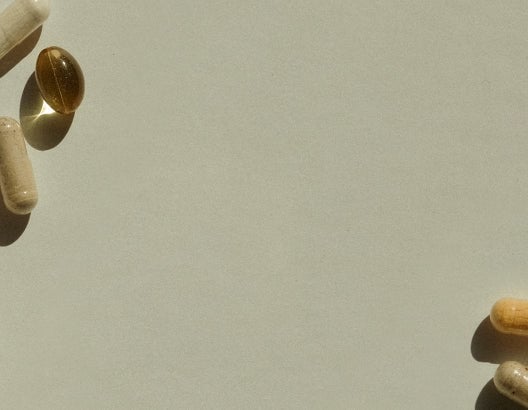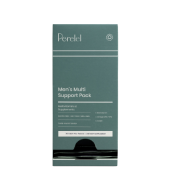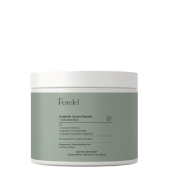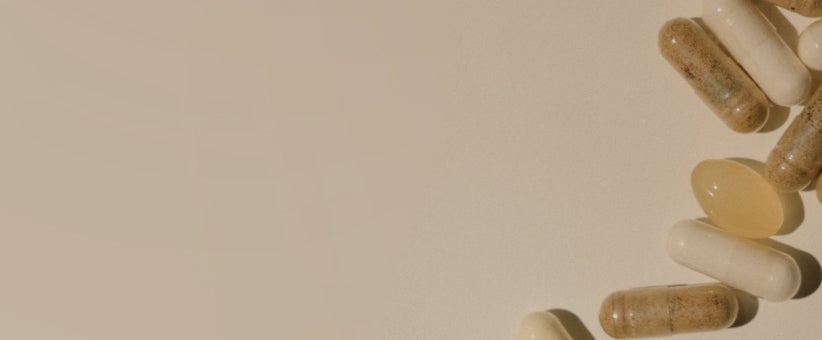For thousands of years, berberine—a bitter-tasting compound found in Berberis plants—has been used in traditional Chinese and Ayurvedic medicine to promote healing and help relieve certain gastrointestinal disorders.1 But more recently, berberine has been getting renewed attention as a natural supplement with wide-ranging health benefits. Research suggests berberine supplements could help to protect your heart health, promote weight loss, ease symptoms of perimenopause and more.
Here are a few reasons to consider adding this powerhouse plant compound to your supplement routine.
Help maintain healthy blood sugar levels
Berberine is most commonly used to help manage blood sugar in people with type 2 diabetes.2 Research suggests berberine can help to lower blood glucose levels, boost insulin production, and reduce insulin resistance.3 In fact, one study found that berberine may even help to manage blood glucose levels as effectively as certain diabetes medications.4 Berberine supplements may also be combined with conventional diabetes medications to bolster their effectiveness5 — though, of course, you should always talk to your doctor before making any changes to your blood sugar management plan.
By addressing insulin resistance, berberine also indirectly influences hormone levels, as insulin plays a crucial role in the regulation of various hormones in the body. (It's why our panel of experts have opted to include this ingredient in our Hormonal Balance Support, as well as our Peri Support Pack.)
Shop the Article:
Help with weight management
Berberine has gotten a lot of buzz for its potential weight loss benefits, thanks to its role in reducing insulin resistance. When someone has insulin resistance, their cells don’t use glucose as efficiently. This can mess with hunger and fullness signals, ramping up your appetite causing you to consume excess calories. Berberine helps the cells use glucose more efficiently, which can help to keep your appetite in check.6
A review of studies suggests berberine supplements can lead to decreased body weight, body mass index (BMI), and belly fat.7 In one study, people with obesity who took 500mg of berberine daily for 12 weeks not only lost an average of five pounds, but also lowered their triglyceride levels by 23 percent and their total cholesterol levels by 12 percent.8
Soothe perimenopause symptoms
During perimenopause, the transitional period leading up to menopause, estrogen levels slowly start to decline. This dip in hormones can lead to symptoms like hot flashes, irregular periods, sleep issues, and mood swings. Perimenopause typically starts sometime in your mid-40s—though some women experience it earlier—and can last for up to 10 years.9
If you’re starting to experience perimenopause symptoms, you may want to discuss a berberine supplement with your doctor. Research suggests berberine may take the edge off certain perimenopause symptoms and reduce the oxidative stress and inflammation associated with this phase of life. Berberine may also help to alleviate symptoms of depression, which can affect up to 30 percent of women during perimenopause.10
Protect heart health
Berberine supplements can benefit your heart in a few important ways. Research suggests berberine supplements may protect against certain cardiovascular risk factors, including high cholesterol, high blood pressure, and irregular heartbeats.11 A review of studies also found that berberine may improve the function of the endothelium, a cell layer that lines the blood vessels. This helps to prevent atherosclerosis, an inflammatory condition that causes the arteries to harden and contributes to heart disease.12
Support reproductive health
Berberine supplements have shown promise as a potential treatment for certain symptoms of polycystic ovary syndrome (PCOS). In one study, women with PCOS who weren’t ovulating took 400mg of berberine daily for four months. At the end of the study, 25 percent of participants had started ovulating, and 14 percent had regained a regular menstrual cycle.13 Research suggests berberine may also improve IVF outcomes among women with PCOS.14
Just keep in mind there’s some uncertainty about whether berberine is recommended during pregnancy.15 If you’re trying to conceive, be sure to tell your OB/GYN if you’ve been taking berberine supplements. Your doctor can help you decide whether to continue taking these supplements after you conceive.
Balance your gut
Berberine has antimicrobial and anti-inflammatory effects that may help to maintain a healthy balance of bacteria in your gut.16 A healthy gut microbiome not only protects against certain digestive disorders, but it can also impact just about every aspect of your overall health —including immune function, metabolism, liver health, mental wellbeing, and more.17
Let us personalize your vitamin
routine in 60 seconds.

What are your
stage-specific needs?
References:
- National Center for Complementary and Integrative Health; In the News: Berberine
- MedlinePlus: Berberine
- Ayudiah Rizki Utami et al; Berberine and Its Study as an Antidiabetic Compound; Jul 2023
- Mojgan Sanjari et al; Safety and efficacy of Berberis integerrima root extract in patients with type 2 diabetes. A parallel intervention based triple blind clinical trial; Mar 2020
- Yaping Liang et al; Effects of berberine on blood glucose in patients with type 2 diabetes mellitus: a systematic literature review and a meta-analysis; Jan 2019
- Cleveland Clinic Health Essentials; What To Know About Berberine: Benefits, Uses and Side Effects
- Omid Asbaghi et al; The effect of berberine supplementation on obesity parameters, inflammation and liver function enzymes: A systematic review and meta-analysis of randomized controlled trials; Aug 2020
- Yueshan Hu et al; Lipid-lowering effect of berberine in human subjects and rats; Jul 2012
- Cleveland Clinic: Perimenopause
- Cristiana Caliceti et al; Potential Benefits of Berberine in the Management of Perimenopausal Syndrome; Feb 2015
- Yun Cai et al; A New Therapeutic Candidate for Cardiovascular Diseases: Berberine; Mar 2021
- Lu Xing et al; Atheroprotective Effects and Molecular Mechanism of Berberine; Nov 2021
- Lin Li et al; A Single Arm Pilot Study of Effects of Berberine on the Menstrual Pattern, Ovulation Rate, Hormonal and Metabolic Profiles in Anovulatory Chinese Women with Polycystic Ovary Syndrome; Dec 2015
- Yuan An et al; The use of berberine for women with polycystic ovary syndrome undergoing IVF treatment; Mar 2014
- National Library of Medicine; Mother to Baby: Berberine; Jun 2023
- American Association of Naturopathic Physicians: 6 Potential Benefits of Berberine You Should Know About
- Fujie Yang; Berberine influences multiple diseases by modifying gut microbiota; Aug 2023























